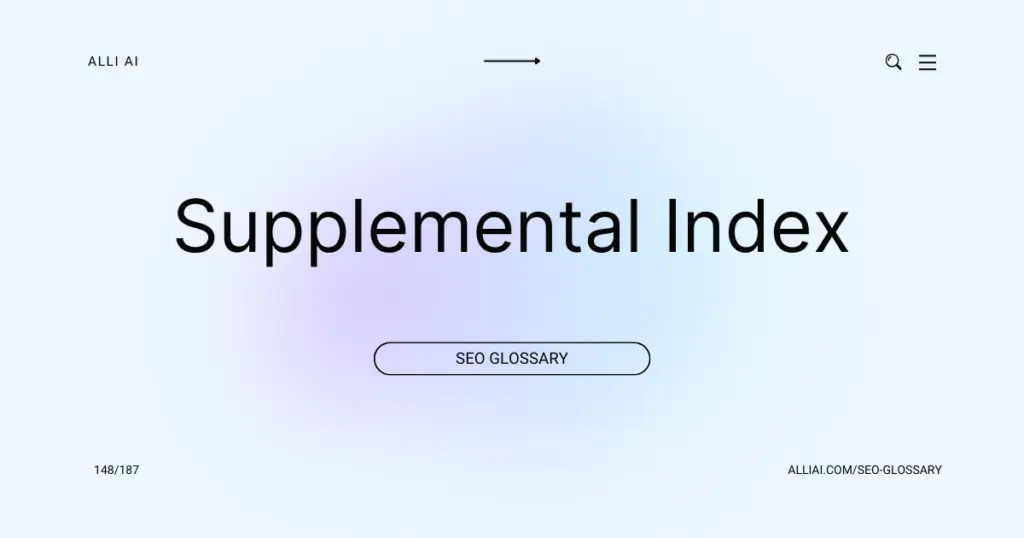What Does Supplemental Index Mean?
The Supplemental Index is a secondary database where Google stores web pages that it considers less important or less useful for users. This typically includes pages with less original content or those that are not frequently updated. Being in the Supplemental Index can impact how often these pages appear in search results.
Where Does Supplemental Index Fit Into The Broader SEO Landscape?
The Supplemental Index was a secondary database where Google stored less important web pages, primarily those deemed to have low PageRank or content that was not frequently updated. Pages within the Supplemental Index were considered less likely to be presented in search results compared to those in the main index, impacting their visibility and potential traffic from search. This concept was significant in SEO as it necessitated strategies to ensure pages were considered valuable enough by Google’s algorithms to remain in or be promoted to the main index, involving practices like increasing backlinks, updating content regularly, and improving overall site quality and user experience. However, Google officially phased out the visible designation of the Supplemental Index in 2007, integrating those pages more seamlessly with the main index, although the distinction between differently valued pages likely still exists implicitly within Google’s indexing and ranking systems.
Real Life Analogies or Metaphors to Explain Supplemental Index
1. Librarian and Bookshelves Analogy: Think of the Supplemental Index in search engines as a library’s backroom storage where less popular or rarely requested books are kept. The main index would be the accessible, frequently-used shelves within the library, holding the books that people check out regularly. The books in the backroom (Supplemental Index) are still part of the library’s collection and accessible, but they are not displayed prominently because they are accessed less often.
2. Menu and Specials Board in a Restaurant: In this analogy, the main index of a search engine is like the main menu at a restaurant, which features all of the popular dishes that are commonly ordered by customers. The Supplemental Index is like the small specials board that hangs on the wall, listing dishes that are still available and part of the restaurant’s offering, but not the first choice of most diners.
3. Warehouse Store: Imagine a large retail store where the most commonly purchased items are placed right at the front and in the most accessible aisles. These represent the main index. Meanwhile, the Supplemental Index is like the items stored in a distant part of the warehouse, where only those looking for something specific or browsing extensively will venture.
4. School Textbooks and Supplementary Materials: In a school setting, the textbooks approved for daily lessons are akin to a search engine’s main index, readily available and frequently used. Conversely, the Supplemental Index resembles the supplementary materials—additional resources such as optional readings or advanced study materials, which are valuable but not the primary tools in everyday learning.
How the Supplemental Index Functions or is Implemented?
1. Crawling: Search engines like Google crawl the web using bots, indexing content from web pages.
2. Storing: Initial data is stored in a primary database, which handles the freshest and most relevant content.
3. Secondary Indexing: Content not deemed important, new, or highly relevant by Google’s algorithms is moved to a secondary, or supplemental, index to save primary index space and processing power.
4. Accessing Data: Queries that are complex, rare, or which exhaust resources in the primary index trigger a fetch from the supplemental index.
5. Index Refresh: Content in the supplemental index is updated much less frequently than the primary index, reflecting its lower priority.
6. Ranking: The ranking of supplemental pages in search results is generally lower, affecting visibility.
7. Integration: Results from both the primary and supplemental indexes are integrated seamlessly to display on the search result page.
Impact Supplemental Index has on SEO
The Supplemental Index of Google can potentially decrease a website’s SEO performance as pages indexed here are often considered less important, causing them to rank lower in search results. This can lead to reduced visibility. Pages in the Supplemental Index are crawled less frequently, which can delay updates from appearing in search results and affect how timely and relevant the user experience is. This differentiation might impact user engagement and site traffic, as less prominent positioning in search results typically leads to fewer clicks.
SEO Best Practices For Supplemental Index
1. Identify Low-Value Content: Review your website to identify pages that might be considered low-value by search engines. These can include duplicate content, very low word counts, and those with excessive advertising.
2. Improve Content Quality: Enhance the quality of the pages identified by adding original, valuable information, increasing the content length, and ensuring it is relevant to the user queries it might attract.
3. Utilize Noindex: For pages that can’t be improved (like privacy policies or terms and conditions), consider using a “noindex” tag to prevent them from being indexed and affecting your site’s performance in search engines.
4. Optimize Internal Linking: Strengthen internal linking to ensure all important pages are easily accessible by search engines and users. Link high-value pages from your main pages or navigation menu.
5. Redirects and Canonical Tags: Use 301 redirects for any permanently moved pages and canonical tags to manage duplicate content better. This helps to consolidate link equity and minimize content redundancy.
6. Enhance User Engagement: Improve site speed, mobile responsiveness, and visual appeal to reduce bounce rates and increase time on site, indicating to search engines the utility and quality of the pages.
7. Regularly Monitor Performance: Use tools like Google Analytics and Google Search Console to monitor how your pages perform after changes. Keep an eye on index status, ranking changes, and site traffic.
8. Update Content Regularly: Keep content up-to-date and regularly refresh old pages to make them more beneficial to users and more likely to be considered for indexing.
9. Manage Crawl Budget: Ensure that your website’s important pages are being crawled efficiently by search engines by optimizing your website’s crawl budget. Use a robots.txt file to block sections that do not add value to search engines.
10. Seek Quality Backlinks: Increase the authority of your website by acquiring backlinks from reputable sources. This external validation can encourage search engines to consider your content valuable and worth indexing.
11. Use Schema Markup: Implement structured data to help search engines understand your content better, potentially increasing the likelihood of it being included in the main index rather than supplemental.
Common Mistakes To Avoid
1. Duplicate Content: If your website has content that is similar to or copied from other pages, those pages on your site might get assigned to the Supplemental Index rather than the Main Index. Avoid this by ensuring each webpage offers unique, valuable content.
2. Low PageRank: Pages with low PageRank are more likely to end up in the Supplemental Index. Improve link quality and quantity through credible backlinks and internal linking to enhance the PageRank of your pages.
3. Shallow Content: Pages lacking substantial content or those considered low value can be relegated to the Supplemental Index. Focus on developing comprehensive, in-depth content that addresses user needs and queries.
4. Poorly Structured Navigation: If search engine crawlers can’t easily navigate your site and find content, they are less likely to index pages in the Main Index. Ensure a clean, logical site structure and use an XML sitemap.
5. Infrequent Updates: Pages that are seldom updated or static for long periods may be considered less relevant and put into the Supplemental Index. Regularly refresh and update your content to keep it relevant.
6. Excessive Use of Affiliate Links: Overuse of affiliate links without adding sufficient value through content can lead to pages being placed in the Supplemental Index. Balance monetization efforts with high-quality content provision.
7. Blocked by Robots.txt: Incorrect configuration of Robots.txt can accidentally block important pages from being crawled, leading to their relegation to the Supplemental Index. Regularly review and correctly configure Robots.txt files.
8. Overuse of Parameters in URLs: URL parameters like session IDs can create multiple URLs that point to the same content, which can cause duplicate content issues. Use the rel=”canonical” link element to prevent these issues.
9. Deeply Nested Pages: Pages that are many clicks away from the homepage may be perceived as less important and end up in the Supplemental Index. Improve the architecture to make important pages more accessible.
10. Lack of External Links: Pages with no external links pointing to them may be seen as less authoritative and end up in the Supplemental Index. Encourage external sites to link to your content through outreach and high-quality content creation.






